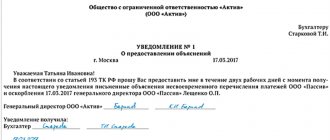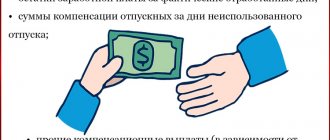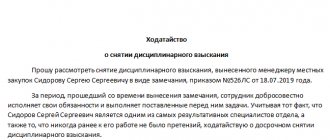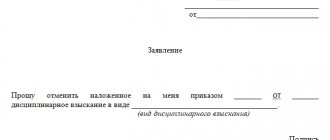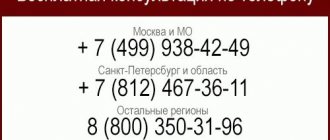general description
The Labor Code of the Russian Federation establishes that disciplinary action is a measure of punishment for an employee for misconduct, which consists of failure to fulfill his or her job duties or their improper performance. Violations of such regulations and agreements as:
- job description,
- orders from the manager;
- labor legislation;
- contract;
- inner order rules.
The impact on the employee is made through intangible means, after which the risk of committing a repeat violation will be significantly reduced due to the fear of inevitable punishment. The current labor legislation establishes certain grounds for penalties. These include both serious violations, for example, being drunk at work, and less serious offenses, for example, being late.
Avoiding punishment is not difficult. The employee only needs to take his job responsibilities responsibly and comply with the discipline rules and labor safety standards established at the enterprise.
Disciplinary Law
Disciplinary action is a form of punishment of an employee for failure to fulfill official duties or violation of labor discipline.
Failure to fulfill the duties specified in the job description and orders of the manager may result in disciplinary action. But to classify this type of misconduct, it is necessary to prove that the employee did not fulfill his labor functions and the incident occurred through his fault.
The legislation also defines the concept of labor discipline. These are the standards of behavior established in the organization, which must be observed by all employees without exception. They are enshrined in an employment or collective agreement, legislation and local regulatory documents of the institution (Part 1.5 of Article 189 of the Labor Code of the Russian Federation).
It is the employer's responsibility to familiarize each employee, against signature, with:
- an employment contract, which spells out the internal labor regulations;
- job description;
- collective agreement (if any);
- other local acts where his functional responsibilities are fixed.
Thus, the employee, having put his signature in the above documents, must understand what job responsibilities are assigned to him in order to fulfill them. Otherwise, the employer will not be able to prove his case in the event of a legal dispute.
To prove the employee’s guilt, it will be necessary to conduct an internal investigation, take an explanation from him, establish a measure of responsibility and the degree of punishment.
Failure to: is not considered a disciplinary violation and cannot cause punishment:
- carry out personal instructions from the manager;
- perform functions that are not included in the employment contract and job responsibilities;
- go to public works (including demonstrations, rallies and cleanup days);
- perform actions that contradict established norms (actions of an illegal nature).
Penalties taken against an employee can include dismissal, as follows from the labor code:
- Part 1-2 tbsp. 192;
- Part 5 Art. 189;
- Art. 193.
Types of penalties
Clarifying comments to Art. 192 and 193 of the Labor Code of the Russian Federation on disciplinary sanctions of 2021 most fully interpret both the types of measures of influence on guilty employees and their application. In particular, Art. 192 of the Labor Code of the Russian Federation divides methods of punishment into two types:
- material;
- intangible.
When imposing any punishment on an employee, the manager must take into account the degree of his guilt, as well as the severity of the offense committed. But it should be remembered that the conditions under which the violation occurred can greatly affect the assessment of what happened. Thus, a specialist being intoxicated at work may be caused by a leak of a toxic substance at work. In this case, even though the employee violated labor discipline, it is unlawful to punish him.
Material sanctions
Material measures include penalties, deprivation of bonus payments, as well as material compensation for damage caused by an employee to the organization’s property.
It should be noted that these penalties are not always legal. For example, the imposition of fines on employees is not established by any legal act of Russian legislation, and therefore the employer may incur administrative or criminal liability for such actions. In addition, deprivation of an employee’s bonus is allowed only if this norm is enshrined in a collective or labor agreement.
Dismissal of an employee
The most severe sanction is dismissal. To apply it to an employee, there must be compelling reasons listed in Art. 192 Labor Code of the Russian Federation:
- regular absenteeism;
- actions due to which the accident or accident occurred;
- disclosure of secret information;
- being at work in a state of intoxication;
- theft or embezzlement.
Before deciding to terminate an employment relationship due to a disciplinary offense, the employer should take into account the specifics of this type of punishment. Thus, disclosure of secret information can serve as grounds for dismissal only when such a condition is specified in the contract. If the absenteeism was an isolated incident, then according to the law the offense is not considered a sufficiently serious reason for terminating cooperation.
Remark and reprimand
Other non-material penalties include reprimand and reprimand. A reprimand is most often made orally and is a warning to the offending employee. Sometimes, on its basis, a written order is drawn up, which is not entered in the work book. A reprimand is formalized and given for more serious violations. Based on the order, it can be recorded in the work book.
Commentary on Article 192 of the Labor Code of the Russian Federation
Article 192 of the Labor Code of the Russian Federation establishes penalties for improper performance of work. Moreover, the list of disciplinary sanctions is exhaustive: reprimand, reprimand, dismissal, as well as some other measures provided only for certain categories of employees.
Nevertheless, almost all modern Russian companies have a system of fines and penalties. Managers believe that negative motivation is much more effective than positive motivation: after all, it disciplines people, and therefore increases their performance.
Legal side of penalties
When talking about negative motivation, employers primarily mean material fines and deductions. However, this particular measure has no right to exist by law. Labor legislation prohibits deductions from wages (Articles 22, 137 of the Labor Code of the Russian Federation), with the exception of some options for accounting deductions (unprocessed advance payment, accounting errors). The only measure of punishment for employees is disciplinary sanctions - reprimands, reprimands, and dismissals (Article 192 of the Labor Code of the Russian Federation).
How is the practice of fines implemented? There are loopholes in any law. And, acting in accordance with the Labor Code, employers still have the opportunity to punish employees financially. It's done like this. Employee salaries are divided into two parts - basic and bonus. According to the law, fines and deductions cannot be applied to the main part, and as many as necessary to the bonus part. At the same time, the company issues a special regulation on bonuses, which is also stated in the employment contracts signed by employees upon hiring. The regulations specify a number of requirements for personnel (work conditions, appearance, production volumes), for failure to comply with which specialists may be deprived of part of the bonus (or the entire bonus). It is in this form that companies practice fines today.
An illustrative example is the system of fines in one well-known company. Depending on the offense (lateness, absenteeism, errors in work), an employee of this company is given from 0.1 point to ten points, and one point corresponds to 2 percent of salary. In the worst case, the employee could be deprived of 20 percent of his income, which is equal to the full amount of bonus payments. The company is confident in the correctness of this approach.
This is important to know: Complaint to the labor inspectorate against an employer: sample 2021
With the help of the punishment system, you can achieve a very high level of executive discipline, but when control for some reason weakens, groups of people appear who begin to lounge around in “smoking rooms” and in kitchens drinking tea. In addition, the total application of the system of negative motivation leads to the fact that only one type of people survive in companies - disciplined, efficient and willing to be punished. And proactive and creative employees quickly leave.
It should also be said that many Russian managers get too carried away and cease to sense the boundaries of the psychological strength of their employees. Beyond this line, people break down and stop believing that they can avoid punishment.
Authorized persons
The head of the enterprise has the right to decide on the application of penalties for violation of discipline. But an organization may have a practice of redistributing powers among officials at different levels. It is fixed by local regulations, such as:
- manager's order;
- job description;
- internal labor regulations.
Thus, the head of a department may have the authority to issue comments and reprimands to employees of his department. In this case, the director of the representative office, who has the appropriate power of attorney, may be vested with full disciplinary powers up to and including termination of the contract with the specialist who committed the offense.
Sample reprimand for improper performance of official duties
In order not to create a new document every time and not remember how this or that information is presented in it, it is better for the company to use a ready-made template. We present one version of the document on the website. Before reprimanding an employee, management will have to take this example as a basis and, if necessary, changing the wording and surname of the offending employee, print the required order.
Application procedure
Article 193 of the Labor Code of the Russian Federation clearly establishes the procedure for applying disciplinary sanctions.
Thus, it is prohibited to punish an employee for one offense with several penalties at once. The manager should choose a certain preventive measure and issue an order based on it. Sometimes, before making a decision on the guilt of an employee, it is necessary to conduct a commission investigation, but usually written evidence in the form of memos and witness statements is sufficient. At the same time, it is necessary to bring the guilty person to financial or civil liability if the violation he committed resulted in damage to the property of the organization, colleagues or third parties. In this case, it is important to comply with all rules and deadlines established by law.
In addition, the employer can apply material penalties to the employee along with non-material penalties. For example, an employee can be reprimanded and deprived of bonuses for the period during which he committed a violation of discipline.
Timing of imposition
The deadlines for imposing penalties are also specified in Article 193 of the Labor Code of the Russian Federation. Disciplinary punishment may be imposed no later than one month from the moment the offense was discovered. But you need to take into account that the following are excluded from this period:
- employee days of incapacity;
- annual leave;
- time spent on the procedure for agreeing on a penalty measure with the trade union;
- period of criminal proceedings.
It should be remembered that there are deadlines after which the issuance of a penalty is considered illegal. So, you cannot punish an employee if:
- 6 months have passed since the date of the disciplinary violation;
- More than 2 years have passed since the misconduct revealed as a result of an inspection or audit.
Compliance with deadlines in the matter of sentencing is very important. Any deviation from the norms established by law is grounds for challenging the penalty.
When can measures be taken?
Before taking disciplinary measures, the administration of the enterprise or the body authorized to carry out such activities must make sure that no more than a month has passed since the discovery of the offense - otherwise, the application of punishment is considered illegal. At this time, the employee’s periods of vacation or sick leave should not be taken into account. When making a decision to punish an employee, you should also make sure that no more than six months have passed since the commission of the offense (if the situation was discovered through an audit or inspection, no later than two years).
Explanation of the guilty employee
To find out the essence of an employee’s misconduct, the manager needs to take a written explanation from him.
In the document, the specialist must describe the reasons for his behavior and the circumstances under which the offense was committed. If the guilty person refuses to provide an explanatory statement, this should not be regarded as a new violation of discipline. The employee’s refusal to write a document within two working days must be reflected in a special act. When drawing up the act, you must indicate the date, place and reason for its preparation. In addition, you should list the witnesses who were present when the specialist was asked to write an explanation, but he refused. The act must be signed by the witnesses indicated in it and a person authorized by the employer.
An employee’s refusal to provide an explanation is not an obstacle to prosecution. Any evidence that the offense was committed by this particular person, as well as an act of refusal to explain, are considered sufficient grounds for imposing a penalty.
Order of punishment
There is no established sample order for disciplinary punishment in the legislation. However, there is a list of information that must be included in this document:
- name of the enterprise;
- number, date and title of the document;
- reason for compilation;
- description of the violation;
- article of the Labor Code of the Russian Federation, in accordance with which the employee was punished;
- surname, name, patronymic of the person responsible for execution;
- director's signature;
- signature of the offending employee;
- Stamp of the company.
The rules for drawing up a document on disciplinary responsibility must be followed exactly, especially if the dismissal of an employee is chosen as a sanction. In the comments to Art. 193 of the Labor Code of the Russian Federation of 2021 contains information that the employee must be familiar with the order within three days from the date of publication of the document. In this case, the employee must confirm his/her familiarity with the order by signing it. If the specialist refuses to sign, then an act should be drawn up, which in form and content is similar to the document refusing to give an explanation.
Another comment on Art. 192 Labor Code of the Russian Federation
1. The employer’s right, formulated in the commented article, is based on the essential elements of the labor relationship. Management of hired labor is based on the manager’s ability to apply unfavorable sanctions to violators of the established order.
2. The employer has the right to hold violators of labor discipline accountable, but can exercise this right at its own discretion: choose the most optimal option from the possible penalties to be applied, or generally refuse to hold the violator accountable. Only in exceptional cases, expressly provided for by law, is the employer obliged to apply disciplinary measures (see, for example, Article 195 of the Labor Code of the Russian Federation and the commentary thereto).
Expert opinion
Novikov Oleg Tarasovich
Legal consultant with 7 years of experience. Specializes in criminal law. Member of the Bar Association.
3. An employee can be brought to disciplinary liability only if he commits a disciplinary offense, which is understood as a culpable failure or improper performance by the employee of his job duties.
An employee can be subject to disciplinary liability if the following conditions are met:
1) the employee’s behavior must be illegal, i.e. his actions must actually not comply with the requirements of the law, the obligations under the employment contract or the orders of the employer based on them. So, for example, it is impossible to bring an employee under 18 years of age to disciplinary liability if he refuses to be sent on a business trip, since his actions in this case will be lawful (see Article 269 of the Labor Code of the Russian Federation and the commentary thereto). Also, it cannot be considered a disciplinary offense if an employee refuses to divide annual leave into parts, which is possible only by agreement of the parties, i.e. the employee has the right to accept the employer’s offer or not. Both types of behavior are legal (see Article 125 of the Labor Code of the Russian Federation and the commentary thereto);
2) as a result of the employee’s actions, damage of a property and (or) organizational nature is caused. An example of the first case would be damage to equipment or loss of documents (as a result of which the employer will have to incur the cost of repairing the equipment or will receive less money). More often, damage of an organizational nature occurs when the order established by the employer is violated (absenteeism occurs, lateness for work is allowed, etc.);
3) the damage suffered by the employer must be a direct consequence of the employee’s violation of labor duties, and, conversely, the cause of the damage must be the employee’s unlawful behavior. In other words, there must be a cause-and-effect relationship between the employee’s misconduct and the resulting damage to his employer;
4) the employee’s actions must be guilty, i.e. committed intentionally or through negligence. If there is no fault in the employee’s behavior in any form, then there is a case that does not give the employer grounds to apply disciplinary action to him. Thus, it is impossible to fire an employee for absenteeism due to being late from vacation due to the cancellation of flights due to meteorological or technical circumstances, confirmed in the prescribed manner.
4. Unlike the list given in Art. 191 of the Labor Code of the Russian Federation, the list of disciplinary measures is exhaustive for the vast majority of employers and employees. Only in certain sectors of the economy where charters and regulations on discipline approved by federal law are in effect, additional disciplinary measures can be applied to employees. This is due to the increased public danger of unlawful behavior by workers in these industries. The list of currently valid statutes and regulations on discipline is given in the commentary to Art. 189 Labor Code of the Russian Federation.
This is important to know: How long is the validity period of a disciplinary sanction?
For example, the Charter on the discipline of crews of support vessels of the Navy (SZ RF. 2000. N 40. Art. 3966) and the Charter on the discipline of maritime transport workers (SZ RF. 2000. N 22. Art. 2311) in addition to penalties listed in Art. 192 of the Labor Code provides for the announcement of a severe reprimand and a warning about incomplete official compliance (SZ RF. 2000. N 40. Art. 3966). The Charter on Discipline of Fishing Fleet Workers (SZ RF. 2000. N 40. Art. 3965), in addition to the above-mentioned disciplinary measures, provides for the possibility of confiscating diplomas from captains and officers of the fishing fleet for a period of up to three years. Such confiscation of diplomas is possible for violation of labor discipline, which created a threat to the safety of navigation, life and health of people at sea, environmental pollution, as well as for gross violation of fishing rules (clause 20 of the Charter). The regulations on the discipline of railway transport workers of the Russian Federation (SAPP RF. 1992. N 9. Art. 608) provide for the possibility of depriving a driver of a certificate for the right to operate a locomotive, and an assistant driver of an assistant driver’s certificate. Similar penalties apply to trolley drivers and their assistants (subparagraph “a”, paragraph 15 of the Regulations). Deprivation of a special right in these cases can be carried out for a period of up to three months or up to one year, depending on the offense and its consequences (see paragraph 16 of the Regulations). Thus, a driver may be deprived of a license to drive a locomotive for a period of up to one year for committing an offense that led to a crash or accident, as well as for appearing at work drunk, in a state of toxic or narcotic intoxication (Part 2, Clause 16 of the Regulations ).
— transfer with the employee’s consent to another lower-paid job or other lower position for a period of up to three months;
— transfer, with the consent of the employee, to a job not related to work in particularly hazardous production in the field of nuclear energy, taking into account the profession (specialty) for a period of up to one year;
— release from a position related to work in particularly hazardous production in the field of nuclear energy with the provision, with the consent of the employee, of other work taking into account the profession (specialty).
These types of disciplinary sanctions should also be recognized as illegal as special cases of forced labor and should be refrained from using them.
6. It should be noted that disciplinary sanctions can only be applied for violations of labor discipline, i.e. failure by the employee to comply with established rules in the labor process. If damage is caused to the interests of the employer outside of working hours or when not performing duties under the employment contract, the employee cannot be subject to disciplinary liability. The Plenum of the Supreme Court of the Russian Federation by its Resolution of March 17, 2004 No. 2 “On the application by the courts of the Russian Federation of the Labor Code of the Russian Federation” (as amended by the Resolution of the Plenum of the Supreme Court of the Russian Federation of December 28, 2006 No. 63) (Rossiyskaya Gazeta. 2004. 4 Aug. N 72; 2006. 31 Dec. N 297) did not include among disciplinary sanctions the case of dismissal of employees for the commission by a person performing educational functions of an immoral act incompatible with the continuation of work (clause 47 of the Resolution). In addition, in this regard, one should take into account the provision of Part 3 of the commented Article 192 of the Labor Code of Russia, which states that dismissal for committing an immoral offense by a person performing educational functions, or the commission of guilty actions by an employee directly servicing monetary or commodity assets, as a type of disciplinary penalties can be applied only if these actions were committed in connection with the performance of work duties by employees.
By a decision of May 24, 2002, the Supreme Court of the Russian Federation also declared illegal the provision on the possibility of applying disciplinary measures to railway transport workers for violation of established rules of conduct in office premises, trains, on the territory of enterprises, institutions and organizations of railway transport, if it was not committed under performance of labor duties (part 3 of clause 14 of the Regulations on the discipline of railway transport workers).
This is important to know: Order to lift a disciplinary sanction: sample 2021
A special type of disciplinary sanction is the dismissal of an employee. In this case, the employer exercises its right to terminate the contract if the other party fails to fulfill its obligations under it. Currently, dismissal as a disciplinary measure should include those carried out on the grounds provided for in paragraphs 5, 6, 9 and 10 of Art. 81 TK; clauses 1 and 2 art. 336 of the Labor Code of the Russian Federation and paragraphs 4, 5, 6 of Art. 341 Labor Code of the Russian Federation. Not all of the listed grounds for dismissal are enshrined in the commented article, but it must be taken into account that the legislator provides an approximate list, without indicating its exhaustive nature.
7. It is necessary to distinguish between disciplinary measures and disciplinary measures. The list of the former should be directly provided for in federal laws (and at present, for now, in acts of the Government of the Russian Federation). The latter can be established in local regulations. Disciplinary measures cannot be offensive to the employee or cause damage to his honor and dignity. These include the following:
1) deprivation, in whole or in part, of the bonus provided for by the organization’s remuneration system for the period in which the disciplinary offense was committed;
2) restriction of the use of social and cultural facilities owned by the employer;
3) reduction in the amount or non-payment of remuneration based on the results of the organization’s work for the year;
4) appointment of extraordinary certification, etc.
Methods of challenging
When an employer has violated the procedure or deadlines for bringing to responsibility, the employee can appeal the imposed punishment.
It should be borne in mind that the manager does not have the right to impose a penalty without requiring an explanatory note from the employee. It is also impossible to apply disciplinary measures if an employee was absent from work due to illness, as evidenced by a certificate of incapacity for work. It is not allowed to impose several punishments for one offense. In addition, the specialist may not agree with the fact of being held liable or with the type of penalty. The employee is given three months from the date of the sanctions to appeal the employer’s actions, but if the person was fired, then the period is one month. To challenge a punishment order, you can file a complaint with the state labor inspectorate, a labor dispute commission, or file a claim with the judicial authorities.
If an employee goes to court, a judicial investigation will be conducted, following which the government agency will make a decision in favor of the plaintiff or his employer. If the court takes the employee’s side, the employer will be obliged to compensate the employee for all expenses, cancel the punishment, and in case of dismissal, reinstate the plaintiff in his position.
What is not considered a measure of influence?
Disciplinary measures are a very good lever in moving an enterprise in the right direction of development. However, in addition to this, there are other ways to stimulate employees of an institution or organization, which at first glance may seem like measures of influence, but in fact they are not. They are also presented in labor legislation. These, for example, include partial deprivation of bonuses or those measures that were applied for violations in other areas of his activity, but not labor (for example, in everyday life, administrative offenses, etc.).
If, within the time period specified by law, the employee was not informed that disciplinary measures had been taken against him, they are also considered invalid. In addition, the announcement of their presence must be made exclusively by written notification, signed by the employee himself. The section of labor law on disciplinary measures also states that if the statute of limitations on the issued order has expired, or the offense has been annulled or repaid, then the sanction is also considered withdrawn.
Removal of responsibility
Disciplinary liability, in addition to dismissal, has a certain duration, which should not go beyond the boundaries of the labor relationship. The law establishes that if an employee has not violated labor discipline within one year from the date of receiving the punishment, then he is considered exempt from punishment.
In addition, the Labor Code provides for the removal of disciplinary liability ahead of schedule under the following circumstances:
- desire of the leader;
- employee statement;
- boss's request;
- request of the representative body.
If the employee has managed to restore his reputation, then release from punishment is quite possible. It is issued by a special order.
Disciplinary sanctions are a way of influencing employees who violate labor regulations and are regulated by Art. 193 Labor Code of the Russian Federation. Comments to it with changes for 2021 allow both heads of organizations and employees of personnel services to hold guilty employees accountable in strict accordance with the law.
Consequences of a reprimand and ways to resolve the conflict
The fact of a reprimand appears only in the employee’s personal card (form T-2). Data about him is no longer recorded anywhere. However, the presence of disciplinary sanctions may be reflected in the amount of bonus payments, year-end bonuses and other types of additional financial incentives (VHI).
Even after a reprimand, the employee can correct the situation in his favor. If there are no violations of labor discipline during the year, the sanction is automatically lifted. They can also be removed ahead of schedule; this requires a petition from the employee himself or his boss. It is worth immediately clarifying that this applies only if the violator is loyal to the conduct of an official investigation regarding his misconduct and there are no refusals to give explanations or sign acts.

